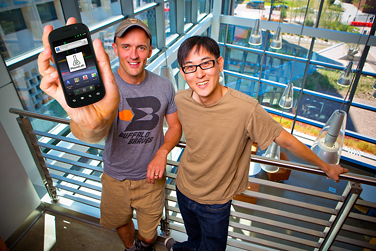
UB researchers are enlisting hundreds of students to build the world’s largest collection of smartphone users assembled for large-scale experiments.
Dubbed PhoneLab, the network will help researchers build more powerful, secure and efficient smartphones and smartphone applications, improve wireless networking and educate students about mobile devices.
While smartphone use is skyrocketing—Forrester Research says 1 billion people will have one by 2016—experimentation on the devices is limited. Researchers either conduct tests in the marketplace, which limits their access to the smartphone, or create their own test group, which is costly and time-consuming.
PhoneLab will solve both problems by offering unparalleled access to a ready test group and their smartphones. In addition to conducting research, the professors will develop undergraduate and graduate classes utilizing PhoneLab. UB students will learn how to program smartphones and smartphone applications, as well as better comprehend how this new computing model is affecting society.
Here’s how it will work:
Using a $1.3 million National Science Foundation grant, UB will equip 200 students with new Google/Samsung-developed Android Nexus S smartphones –sorry IPhone aficionados– and one year of free service with Sprint featuring unlimited voice and data plans. In exchange, UB students agree to participate in experiments every week. After one year, students will receive discounted monthly bills of about $44.
While Google, Samsung and Sprint are providing goods and services toward PhoneLab, they will not influence the experiments. The program will be available to accredited researchers at no cost, and UB will decide how experiments proceed.
PhoneLab will expand soon to UB faculty and staff, issuing an additional 250 smartphones. UB plans to hand out another 250 phones in August 2014, growing to 700 participants.

